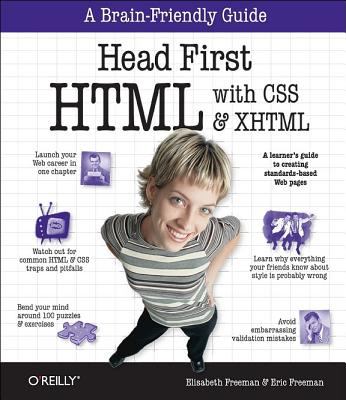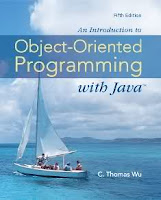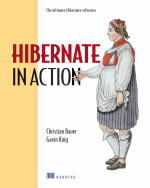 Tired of reading HTML books that only make sense after you're an expert? Then it's about time you picked up Head First HTML with CSS & XHTML and really learn HTML. You want to learn HTML so you can finally create those web pages you've always wanted, so you can communicate more effectively with friends, family, fans, and fanatic customers.
Tired of reading HTML books that only make sense after you're an expert? Then it's about time you picked up Head First HTML with CSS & XHTML and really learn HTML. You want to learn HTML so you can finally create those web pages you've always wanted, so you can communicate more effectively with friends, family, fans, and fanatic customers.You also want to do it right so you can actually maintain and expand your web pages over time, and so your web pages work in all the browsers and mobile devices out there. So what are you waiting for? Leave those other dusty books behind and come join us in Webville. Your tour is about to begin.
About the Author
Elisabeth Robson (formerly Freeman) is coauthor of O'Reilly's Head First Design Patterns and Head First HTML with CSS & XHTML. She is currently Special Projects Director at O'Reilly where she is developing new brain-friendly learning ideas and products.
Eric Freeman is a computer scientist with a passion for media and software architectures and coauthor of Head First Design Patterns. He just wrapped up four years at a dream job-- directing internet broadband and wireless efforts at Disney--and is now back to writing, creating cool software, and hacking Java and Macs. Eric spent a lot of the '90s working on alternatives to the desktop metaphor with David Gelernter (and they're both still asking the question, "Why do I have to give a file a name?"). Based on this work, Eric landed a Ph.D. at Yale University in 1997. He also co-founded Mirror Worlds Technologies (now acquired) to create a commercial version of his thesis work, Lifestreams.
In a previous life, Eric built software for networks and supercomputers. You might know him from such books as JavaSpaces Principles Patterns and Practice. Eric has fond memories of implementing tuple-space systems on Thinking Machine CM-5s and creating some of the first internet information systems for NASA in the late 1980s.
In a previous life, Eric built software for networks and supercomputers. You might know him from such books as JavaSpaces Principles Patterns and Practice. Eric has fond memories of implementing tuple-space systems on Thinking Machine CM-5s and creating some of the first internet information systems for NASA in the late 1980s.

























